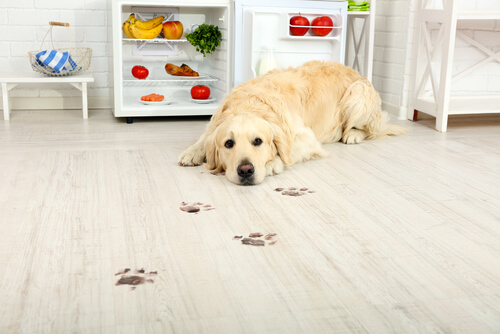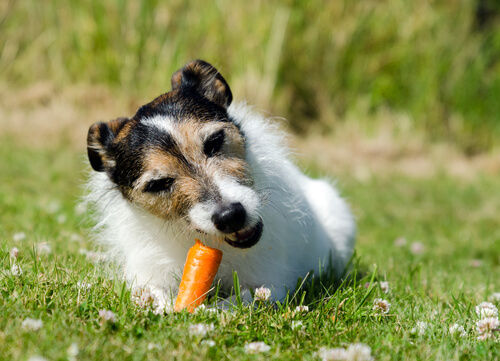The Benefits of Feeding Carrots to Your Dog

You might think that carrots are useful vegetables only for rabbits and humans, but not to dogs. However, they provide many benefits for man’s best friend. They are great for rewarding dogs when they behave well, or as a way to show them how much we love them. But that’s not all– they are also excellent for canine health. Find out more in this article.
What are the benefits of carrots for dogs?
This delicious vegetable is a must-have to keep on hand at home, since it is good for your human family members as well as your canine ones. Here are a few benefits of carrots:
They are nutrient- rich

Among the vitamins contained in carrots are A, B, B1, B6, C, D, and K, which all favor the immune system. They also have carotenoids, minerals, phosphorus, calcium, sodium, potassium, and chlorine.
They improve dental health
If your dog eats raw carrot (peeled or not), its hard texture will help clean up residues that accumulate in his teeth, molars, fangs, and gums. While it is not the only thing that aids oral hygiene (it is recommended to brush your dog’s teeth after he is 7 months old), carrots are an extraordinary complement.
They regulate the nervous system
Carrots are the perfect snack between meals. They are healthy, rich in nutrients, and excellent for your dog to chew on, reducing his levels of anxiety and stress.
They quench your dog’s hunger
There are plenty of gluttonous dogs who want to eat constantly. You can give them carrot pieces between lunch and dinner, for example, and satiate their appetites so that they will be less anxious for dinnertime to arrive.
They help pregnant dogs
If your pet is about to give birth, don’t hesitate to feed her carrots, since they improve blood volume and milk production.
They improve skin and vision
Thanks to vitamin A and carotenoids, carrots are great for an animal’s skin health (for example, these vitamins reduce sun damage). They also prevent ocular problems, such as cataracts.
They can be helpful for obese dogs
In addition to helping abate hunger, this vegetable is recommended for overweight dogs and older adults because it does not contain fat and has high water content.
How to feed carrots to your dog
If you are accustomed to giving your dog a reward every time he does something good, try giving him carrots instead of store-bought treats and snacks. They are cheaper, easy to store, low in calories, and can be shared with humans, too!
Wash the carrots well before giving them to your dog. Cut the tips and feed them raw. You may give a whole carrot or just a portion, depending on the size of your dog. Some people choose to use “baby” carrots, since they are smaller and reduce the risk of becoming trapped in a dog’s throat and causing choking.

In addition, they can replace rawhide or similar foods. Many dogs can spend hours chewing and gnawing on carrots. Don’t forget to supervise, since there is a risk of choking.
You can also feed your pet cooked carrots, but they will not clean your dog’s teeth or reduce his anxiety and chewing instincts. They will not provide as many nutrients since these are lost in the cooking process. Furthermore, you may accidentally give them to your dog with added salt or spices.
Don’t overdo the amount of carrot you feed your dog. It is normal for his stool to be a little orangey or to have visible pieces of vegetables. If you opt to use baby carrots, start by giving one per day, increasing until you reach 4 for small dogs, 6 for medium ones, and up to 8 for large canines.
If you use regular carrots, only feed a maximum of 2 per day. Don’t forget that dogs with digestive problems or diabetes should not consume them. What do you think about giving carrots to your dog? Will you try it out?
You might think that carrots are useful vegetables only for rabbits and humans, but not to dogs. However, they provide many benefits for man’s best friend. They are great for rewarding dogs when they behave well, or as a way to show them how much we love them. But that’s not all– they are also excellent for canine health. Find out more in this article.
What are the benefits of carrots for dogs?
This delicious vegetable is a must-have to keep on hand at home, since it is good for your human family members as well as your canine ones. Here are a few benefits of carrots:
They are nutrient- rich

Among the vitamins contained in carrots are A, B, B1, B6, C, D, and K, which all favor the immune system. They also have carotenoids, minerals, phosphorus, calcium, sodium, potassium, and chlorine.
They improve dental health
If your dog eats raw carrot (peeled or not), its hard texture will help clean up residues that accumulate in his teeth, molars, fangs, and gums. While it is not the only thing that aids oral hygiene (it is recommended to brush your dog’s teeth after he is 7 months old), carrots are an extraordinary complement.
They regulate the nervous system
Carrots are the perfect snack between meals. They are healthy, rich in nutrients, and excellent for your dog to chew on, reducing his levels of anxiety and stress.
They quench your dog’s hunger
There are plenty of gluttonous dogs who want to eat constantly. You can give them carrot pieces between lunch and dinner, for example, and satiate their appetites so that they will be less anxious for dinnertime to arrive.
They help pregnant dogs
If your pet is about to give birth, don’t hesitate to feed her carrots, since they improve blood volume and milk production.
They improve skin and vision
Thanks to vitamin A and carotenoids, carrots are great for an animal’s skin health (for example, these vitamins reduce sun damage). They also prevent ocular problems, such as cataracts.
They can be helpful for obese dogs
In addition to helping abate hunger, this vegetable is recommended for overweight dogs and older adults because it does not contain fat and has high water content.
How to feed carrots to your dog
If you are accustomed to giving your dog a reward every time he does something good, try giving him carrots instead of store-bought treats and snacks. They are cheaper, easy to store, low in calories, and can be shared with humans, too!
Wash the carrots well before giving them to your dog. Cut the tips and feed them raw. You may give a whole carrot or just a portion, depending on the size of your dog. Some people choose to use “baby” carrots, since they are smaller and reduce the risk of becoming trapped in a dog’s throat and causing choking.

In addition, they can replace rawhide or similar foods. Many dogs can spend hours chewing and gnawing on carrots. Don’t forget to supervise, since there is a risk of choking.
You can also feed your pet cooked carrots, but they will not clean your dog’s teeth or reduce his anxiety and chewing instincts. They will not provide as many nutrients since these are lost in the cooking process. Furthermore, you may accidentally give them to your dog with added salt or spices.
Don’t overdo the amount of carrot you feed your dog. It is normal for his stool to be a little orangey or to have visible pieces of vegetables. If you opt to use baby carrots, start by giving one per day, increasing until you reach 4 for small dogs, 6 for medium ones, and up to 8 for large canines.
If you use regular carrots, only feed a maximum of 2 per day. Don’t forget that dogs with digestive problems or diabetes should not consume them. What do you think about giving carrots to your dog? Will you try it out?
This text is provided for informational purposes only and does not replace consultation with a professional. If in doubt, consult your specialist.







